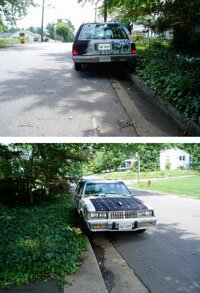THE TOUGH CUSTOMER- Curb that impulse: Tickets must be based on laws

Starosta fought City Hall when they ticketed him for this.
PHOTO COURTESY BORIS STAROSTA
Well, you can throw one old saw onto the junk heap: apparently you can fight City Hall.
Sure, it takes some time and effort, but the taste of victory can be sweet, even for those of us who get to enjoy it only vicariously.
Boris Starosta is one of many well-known professional photographers who call Charlottesville home. For the past ten years, Starosta says, he has been parking his car in front of his Rockland Avenue home, partially on his lawn and partially in the road. But last month, this regular parking spot earned him a $10 ticket.
The reason Starosta parks like that, he explains, is safety.
"My car and the cars of others have been struck and damaged by passing cars along this curb," Starosta wrote to the city treasurer in his appeal of the July 18 ticket. "This is because Rockland Avenue is very narrow at this point, and sometimes people misjudge the gaps. To help the situation, I take care to park as far from the centerline as I can."
Even so, safety was not the basis of Starosta's appeal. His main complaint was that he did not know what he had, in fact, done wrong.
On the ticket left on his car, the officer had checked off "Other" as the infraction, adding, "not parked completely on st.," in the ticket's comments section.
"I cannot properly contest this violation," Starosta wrote the treasurer, "if I do not know what city code is being violated. I respectfully ask that you please give me the code section that I am violating ... so that I can look it up."
The treasurer could not do that, though, because apparently there is no applicable city code. So the treasurer just granted Starosta's appeal and canceled his fine.
But someone in the city treasurer's office had to get the last word in, writing on the favorable ruling sent to Starosta, in all capital letters: "However, change to warning, vehicle must not park on sidewalks or curbs."
Starosta wasn't ready to accept victory if it meant being placed on some governmental version of double secret probation.
"My initial polite request for a code citation was ignored," Starosta wrote us. "I have no choice now but to engage the city attorney in my quest to figure out the law in this case."
Starosta says he proceeded to read the city code, and on August 1 wrote back to city attorney S. Craig Brown that he "can find no references to ‘parking completely on the street' (the basis of the original charge against me), nor ‘parking with wheels on a curb' (the basis of the warning against me). I have looked especially hard at paragraphs 15-29, 15-136, [and] 15-151, which seem tangentially relevant. Even in these paragraphs, I cannot find an interpretation that applies to my situation."
To its credit, the city attorney's office knew when it was beat.
Starosta says he received a response on August 8 wherein the attorney's office "reviewed my arguments and the code and quoted a few other codes, but basically came to the conclusion that– absent a sidewalk– I was in the right." The letter noted that someone in the office had spoken with the police to ensure Starosta would not be ticketed again.
Obviously, the $10 fine was not the issue: Starosta acknowledges that he began losing financially after the first ten minutes he spent resolving the issue. But that's not his point.
"Good government is the product of direct participation," he says, "and sometimes this means putting up a fight, not taking it lying down. This might have been a minor ticket, but to not fight the minor battles, means you're obviously getting ready to not fight the major ones."
#